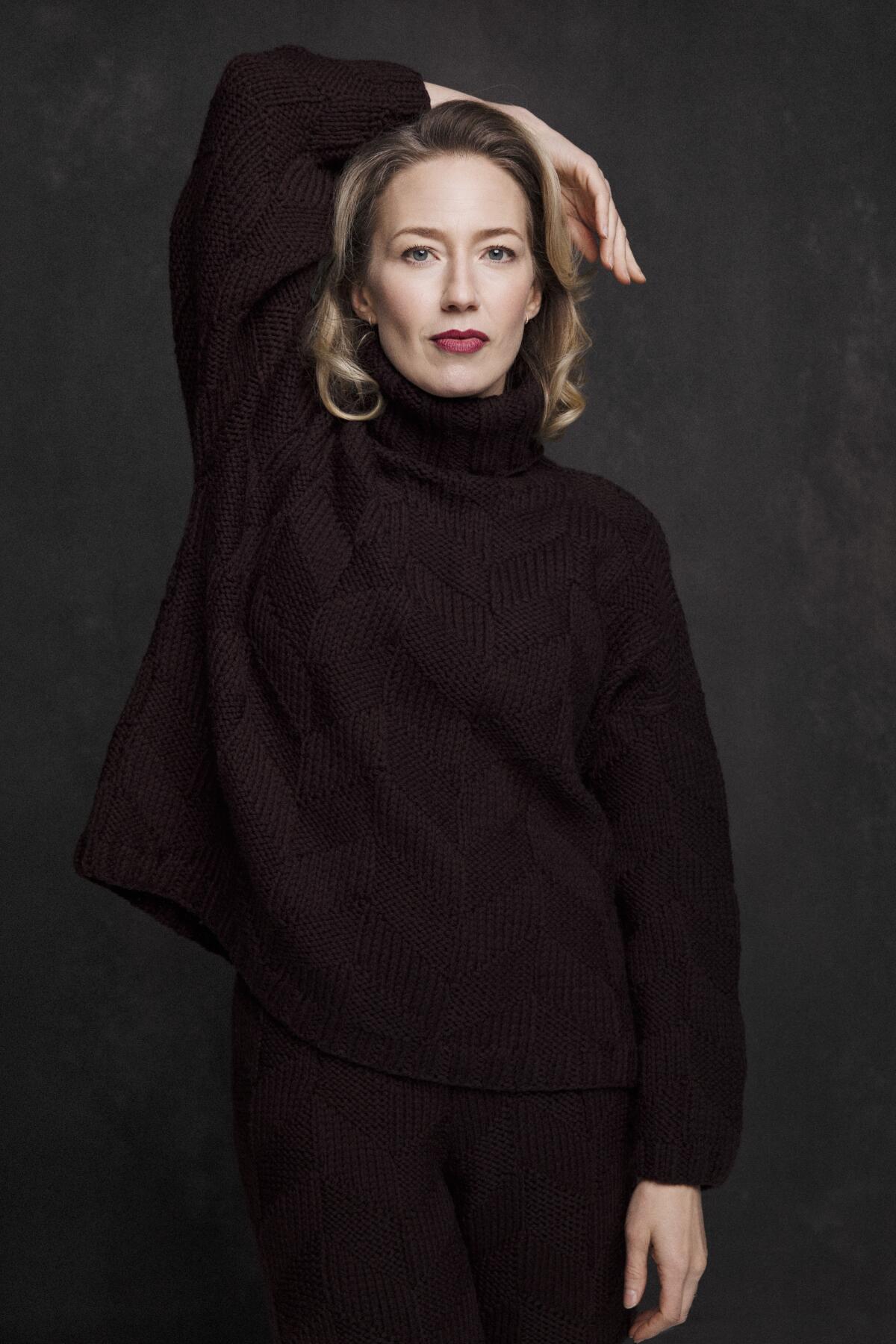Carrie Coon delves into the dynamics of marriage in ‘The Nest’

As one of Hollywood’s most versatile actors, Carrie Coon has a way of projecting humanity and simmering intelligence in whatever role she’s handed, whether in TV series like “Fargo” and “The Leftovers,” while on stage (sometimes with her husband, actor-playwright Tracy Letts), or most recently, as a bewildered wife who takes charge in the new suspense film “The Nest.” Speaking with The Envelope on a recent rainy New York day, Coon discussed strong female roles, unexpected movie consumption amid quarantine, and having — or not — a magic “Mom” button.
You’ve been one of the lucky actors who’s been able to work during quarantine; you’ve been shooting “The Gilded Age.” But before that, you were stuck at home like the rest of us. How did you cope?
We were in the last week of the run of my husband’s play “Bug” when the Illinois shutdown happened. Likewise, he was about to open his show on Broadway, “The Minutes,” and his producer led the charge for shutting down Broadway. So [Letts] hopped in the car and made it to our house in Chicago just in time for our 2-year-old’s birthday. This is the longest we’ve ever spent in our home together in Chicago since we got married seven years ago. So, it was actually quite a gift for us as a family to be home. My husband has an astonishing DVD collection, and all he’s wanted to do for the last 10 years was be home and watch movies in his basement, and he’s gotten the opportunity to do that.
I’d just had this image of you and Tracy reading plays aloud all evening.
That’s so lovely. We do take in some pretty obscure films, so I hope that counts. We put out a good front, but we’re not as elitist as we may appear in the press. But we put out a quarantine [movie] list on Twitter, which was a lot of fun.
What was at the top of the list?
There were a couple of really strong female performances — “An Unmarried Woman,” “Woman Under the Influence” — but also things like “The Cremator,” which was stirring for the moment we’re in, just the banality of evil. And we watched “Piranha” and “The Howling.” So, our taste is all over the map.
“The Nest” seems to echo some of those films, in a way: You’re a strong female in the role, and it’s got this undercurrent of dread, if no flesh-eating fish. What appealed to you about it?
Oftentimes in a movie about marriage, especially one that deals with the perils of ambition, you imagine the story centers on the man, and the women and children are collateral damage. But this movie was a true 50/50 lead and about the dynamics of marriage. And it was about the tacit agreements we make that need to be renegotiated when things start to deteriorate. I had never seen a movie that was really about marriage that didn’t have infidelity, or divorce, or a dead child. I get dead children scripts all the time.
It feels outré and cliché for films to feature dead wife/dead girlfriend stories these days, so maybe what’s shifting is the source of the emotional pain — dead children.
I still get that kind of script pretty regularly, probably because of my work in “The Leftovers.” What I feel really is happening is that though the industry is trying to diversify the voices that are enabled by the gatekeepers to tell stories, it’s still dominated by men and male story structure. I don’t think we’ve figured out exactly what a female hero story even looks like. The female hero narrative is different than the male narrative.
In “The Nest,” you played a mom to two kids. Did you play that role any differently because you were a new parent while shooting it?
I thought there would be a magic “Mom” button, but I didn’t feel anything different. I’m curious if there’s some sort of mildly perceptible shift that happens in an actor where it seems slightly more authentic, but that’s something only an audience can determine. I do find that harm done to children [in movies] is very challenging for me. It hits closer to home. It would have to be a really important story for me to want to go into that space, which surprised me.
You grew up in a rural area of Ohio; do you think having that freedom to run around fired your imagination to become an actor?
I’m sure it didn’t hurt. I feel heartsick for kids who don’t have that. I’m raising my boy in a city, and at this point I’d love to get him out into the country. It’s hard for me to understand how you raise a child any other way. I want my boy to have the opportunity to be kicked out the back door and have it locked behind him, and he’s not allowed to come in until dinner.
Once we’re all free to leave the house and hug each other again, what’s the first thing you plan on doing?
I want to see my parents and my grandparents. I have three grandparents in their 90s. I have four siblings, and some of them have kids, and they’re all in the same town and we have not seen them since last Christmas. And my son is arguably in one of the cutest, most interesting transitional years and they have missed all of it. So fingers crossed [for the vaccine’s impact]. Let’s protect the vulnerable and maybe remake the whole system — if we can.
More to Read
From the Oscars to the Emmys.
Get the Envelope newsletter for exclusive awards season coverage, behind-the-scenes stories from the Envelope podcast and columnist Glenn Whipp’s must-read analysis.
You may occasionally receive promotional content from the Los Angeles Times.










